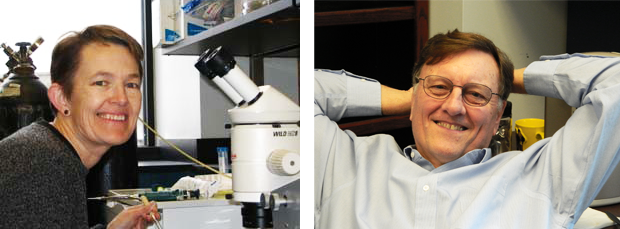Christopher Wylie and Janet Heasman Honored with SDB Lifetime Achievement Award
Christopher Wylie and Janet Heasman win
2014 Elsevier-Society of Developmental Biology Lifetime Achievement Award.

Xenbase and Xenopus research community congratulate Christopher Wylie and Janet Heasman for a lifetime of achievement and their lasting impact on Developmental Biology. Together and individually, Janet and Chris discovered many fundamental cell and embryological processes, which are now the mainstay of Developmental Biology text books.
Chris Wylie started his research career in 1963, at University College Hospital Medical School, followed by his BSc in 1966, and his PhD in 1971. He lectured in Anatomy at University College London (importantly he soon met Janet there, and through happenstance, never did finish his MD) and St. George's Hospital Medical School, where he was Chair and Professor of Anatomy and Embryology.
Janet started in medical school at University College London in 1971 and gained her BSc in anatomy in 1974. She then completed her PhD in 1979, studying the formation and migration of primordial germ cells in Xenopus, with Chris Wylie. In the 1980’s, Janet lectured in Anatomy in London and at Harvard Medical School, publishing numerous papers on cell fate and cell movement, before she and Chris accepted posts at the University of Cambridge, Zoology Department in 1988.
In Cambridge, Janet & Chris were part of the founding group (along with John Gurdon, Ron Laskey, and Martin Evans) whom successfully petitioned the UK’s two big funding agencies, the Wellcome Trust and the Cancer Research Campaign, to fund a major center for Developmental Biology in Cambridge. Originally named the Wellcome Trust/Cancer Research Campaign Institute for Cell and Developmental Biology, the globally important center was recently renamed The Gurdon Institute.
In 1994 the Wylie-Heasman lab moved to the University of Minnesota School of Medicine, to build a Developmental Biology Center. Chris’s goal was to bring together the “basic science underlying organogenesis with the clinical results of organ dysgenesis”. Continuing to promote Developmental Biology as an integral component of modern biomedical research, Wylie and Heasman relocated to the Division of Developmental Biology at Cincinnati Children’s Research Foundation in 2000. As division director Chris built a major center of organogenesis research, assembling a team of 22 primary DB faculty, along with 22 cross-appointed faculty from 17 different clinical divisions at the hospital. The result was close and productive interactions between the basic research scientists and clinicians – to provide better diagnoses, treatments and ultimately cures, for childhood disorders.
Throughout their careers, Chris and Janet made many important discoveries on fundamental aspects of development using Xenopus as a model system. With over 120 research publications their significant contributions include important discoveries on germ cell formation and migration, the critical functions of the cytoskeleton and cell adhesion in the early embryo, role of maternal factors such transcription factor VegT and nodal signaling in germ layer formation, and they demonstrated that Wnt/beta-catenin signaling controls dorsal axis formation in vertebrates. They also pioneered new approaches to knockdown gene function in Xenopus. They developed the “antisense oligo mediated host-transfer” technique to deplete maternal mRNAs in the oocyte and they were the first to use antisense morpholinos in Xenopus; see Heasman Kofron and Wylie (2000).
Both Chris and Janet are exceptionally gifted lecturers and mentors. They trained and inspired several generations of developmental biologists through their own lab, and through their years of teaching at the MBL Woods Hole Embryology and the Cold Spring Harbor Xenopus courses.
Another lasting impact was Wylie’s transformation of the journal JEEM into the modern high impact journal Development in 1986. He served as Editor in Chief of Development for 16 years. Wylie also served at the SDB president and received the British Society for Developmental Biology ‘s Waddington Medal in 2011.
Since retiring in 2011, Janet has focused on women’s advocacy and creative writing. Chris retired in 2013, and the family relocated to Vermont, to enjoy the good life. They still keep a two-headed training stereo microscope in their home to show their grandchildren the fascinating developing tadpoles from the local pond.
The SDB awards presentations will take place during the Awards Lectures session at the 73rd Annual SDB Meeting at the University of Washington, Seattle, WA, Sunday, July 20, 2014.

Click here for Janet Heasman's publications represented on Xenbase.
Click here for Chris Wylie's publications represented on Xenbase.
Last Updated: 2014-01-29